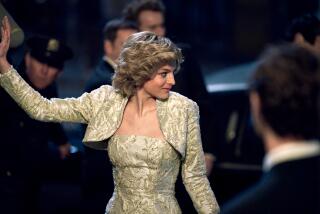War Movie: Last Leave, 1944, By PATRICIA STORACE
- Share via
Then. No. Now.
A long silk scarf of a voice, pulled through
the loop of throat--
Jo Stafford singing on the radio.
He wants so much to hear a voice like that, and it exists,
as simply as creation, the way the world provides
an image for the feeling
that’s richer than the feeling, so that
part of the satisfaction
is possession, part the perfection of the longing.
The way you know through flowers what
perfect human flesh is,
the way the wife perfects the dim maternity she somehow
flowered from,
and you derive the gold circles on your hands
from the sun’s blinding ultimate wedding band.
There’s a hotel room with a key that fits the door,
and inside, drinking coffee, arguing
or sleeping, the two of them keep marrying.
The arch of every nine-to-five is Notre Dame
where, strangely, you don’t need ever to have been.
On Lexington, walking with his arm around her,
he sees a man lunching on a roll and a cold beer,
and he’s so goddamned grateful that he has to swear.
Love is good work, but they stagger sometimes
like a pair of stevedores beneath all the thinking
that it takes to feel, and strange to know precisely
how young on Bleecker and who you are
at three-fifteen is:
bronze and sculpture.
And they’ve got tickets for the Lombard picture.
The quivering caged canaries of the houselights dim;
the audience, cashmered in theme and shadow, dreams
the accumulating story as it snows on them.
The pilot is at peace, living in the film,
but his young wife only watches him, an afterlife
of movie changing his right cheek. She’s swept under fire,
sensing all alone the dark is inexhaustible.
She’s in love and terror; and it’s hers now,
the world’s parure, the legendary suite of matched
black jewels.
And she watches the angle of her husband’s head
cresting from his shoulders, and she swears
that if it’s asked of her, she’ll care
for his death as tenderly as any child
his body gives to her.
The screen swastika flickers in his wire rims.
She strokes his hair, he turns; she takes the cross
from him.
Their young night comes toward them outside
like a daughter,
wearing city lights like white gardenias in her hair.
Effortlessly, unlike Christ’s disciples, they stay awake
with her, the fifth of their five nights, the brunette girl
that history--older, experienced, irresistible--
is about to take.
From “The Best American Poetry, 1991,” edited by Mark Strand (Scribner’s: $27.95.) . Storace was born in Chicago and grew up in Mobile, Ala. Her book of poems, “Heredity,” won the Barnard New Women Poets Prize . 1991 by Patricia Storace. Reprinted with permission.
More to Read
Only good movies
Get the Indie Focus newsletter, Mark Olsen's weekly guide to the world of cinema.
You may occasionally receive promotional content from the Los Angeles Times.










